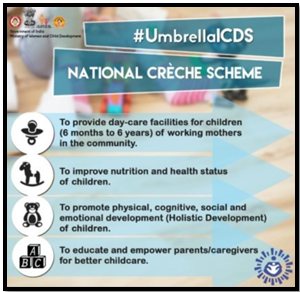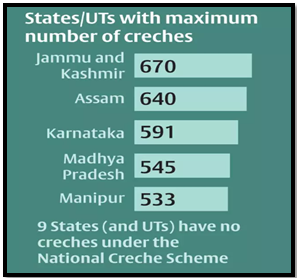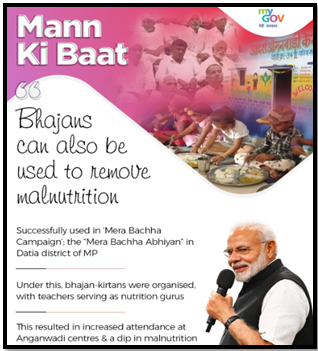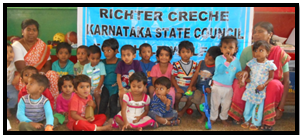IMPOSSIBLE WITHOUT WELL-NOURISHED CHILDREN
Syllabus
- GS2: Issues Relating to Development and Management of Social Sector/Services relating to Health, Education, Human Resources.
Why in the News?
- Malnutrition poses a formidable challenge to India’s ambition of achieving developed nation status by 2047.
- The absence of adequate creche facilities, especially in the unorganised sector, leads to tragic incidents and irreversible malnourishment, demanding urgent attention and innovative solutions.
Source: mygov.in
Childhood at Risk: The Consequences of Neglected Creches
Teacher’s Lament
- In Tumakuru, a teacher’s poignant poem, “I don’t need this Smart City,” unveils the distressing reality of young children left unattended due to the SMART City project’s failure to provide creches.
Construction Site Hazards
- Tragic Accidents: Little children at construction sites face perilous situations, from being run over by reversing cement lorries to falling into open sumps.
- Maternal Dilemma: Mothers, engaged in laborious tasks, grapple with the dual challenge of earning a livelihood and ensuring their toddlers’ safety.
Heart-Wrenching Incidents
- Stray Dog Tragedy: A heartbreaking incident involves a stray dog mauling a toddler to death at a construction site.
- Roadside Peril: Toddlers left unattended by a roadside face the horrifying risk of being run over and flattened by a road roller.
Neglected Parenthood: The Price of Unresponsive Employers
Employer Indifference
- Patriarchal Apathy: Many employers, and even government agencies, display a callous disregard for the welfare of young children by failing to provide essential creche services.
- Contractor’s Disdain: A contractor’s shocking response, refusing creche facilities to female workers, reflects a deeply ingrained patriarchal mindset.
Source: The hindu
Gendered Responsibility
- Burden on Women: The prevailing attitude implies that childcare is solely a woman’s duty, absolving men and the government of any responsibility.
- Survival Struggles: The lack of support leads to irreversible malnourishment during the critical first 1000 days of a child’s life, contributing to India’s alarming malnutrition rates.
Malnutrition’s Impact on Future Prosperity
Rajan’s Candid Observations
- Critical Reflection: Former RBI Chief, Raghuram Rajan, underscores the gravity of India’s malnutrition crisis during a discussion on his latest book.
- Bleak Future Projections: Rajan questions the viability of India’s ambition to become a developed nation by 2047 with a staggering 35% malnutrition prevalence.
Challenges Ahead
- Workforce Competence: Expresses concerns about the future workforce’s capability to compete in an AI-dominated landscape.
- National Shame: Urges the nation to view high malnutrition levels among children as a collective shame demanding urgent eradication efforts.
Transformative Creche Policies: A Call for Constitutional Reform
Constitutional Amendments Advocated by Law Commission
- Legal Mandate: Existing laws tie creche provision to the number of employed women, prompting the Law Commission’s recommendation for a constitutional overhaul.
- Enforceable Right: Proposed Article 24A in Part III aims to establish an unconditional right for every child under 6, shifting responsibility from employers to the state, especially crucial in the unorganised sector.
PM Modi’s Approach
- Citizen Participation: In ‘Mann Ki Baat,’ PM Modi shifts focus from legal mandates to community involvement in combatting malnutrition.
- Innovative Initiatives: Highlights unique campaigns like ‘Mera Bachha’ in Madhya Pradesh and educational games in Jharkhand, showcasing diverse approaches to address malnutrition.
Budgetary Neglect: A Looming Crisis in National Creche Scheme
Fiscal Downturn and Alarming Cuts
- Funds Freezing: Startling revelations expose the absence of Union government funds for the National Creche Scheme in FY 2021–22.
- Budgetary Erosion: The scheme witnesses a disconcerting 59% decline in budget allocation over the past three years.
Source: mygov.in
Drastic Reduction in Operational Creches
- Shrinking Network: Out of 18,040 functional creches in FY18, a staggering 11,582 cease operations by FY20.
- Operational Crisis: The diminishing count hits a critical low, plummeting to 6,458 operational creches.
Creche Closure Crisis in Karnataka
Board’s Financial Resource
- Accumulated Funds: The Building & Other Construction Workers’ Welfare (BOCWW) Board holds Rs 6,000 crore in accumulated funds.
Unfortunate Creche Closures
- Mandated Initiative: A Government Order entrusted the BOCWW Board to operate creches for construction workers’ children in every ward or group of wards.
- Alleged Irregularities: Despite significant funds, the Board shuts down 137 creches, citing irregularities in their functioning.
Hopeful Initiative: ‘Koosina Mane’
Source: KSCCW.in
Karnataka’s Positive Move
- Announcement by CM Siddaramaiah: The 2023–24 budget includes plans for establishing ‘Koosina Mane’ (Child’s Home) in 4,000 gram panchayats.
Target Beneficiaries
- MGNREGA Workers and Local Mothers: The initiative aims to benefit mothers working under the Mahatma Gandhi National Rural Employment Guarantee Act (MGNREGA) and other mothers in proximity.
Ensuring Adequate Childcare: Challenges and Considerations
‘Koosina Mane’ Evaluation
- Laudable but Insufficient: While ‘Koosina Mane’ is commendable, questions arise about its adequacy to meet the childcare needs of all working women, especially in urban areas.
Feasibility Concerns
- Funding and Infrastructure Challenges: Existing Anganwadis face financial and infrastructure constraints, raising doubts about the feasibility of establishing parallel structures.
Urban Focus and Anganwadi Enhancement
- Neglect of Urban Areas: Urban construction hubs lack focus, and there’s a need to extend childcare services to women engaged in urban labor.
- Anganwadi Upgrade: Consideration should be given to upgrading existing Anganwadis as phased daycare centers, although challenges in their current capacity may arise.
Revamping Childcare: A Comprehensive Approach
Constitutional Amendment Proposal
- Extending Fundamental Right to Education: The Law Commission recommends amending Article 21A to include the 3–6 age group, ensuring the Fundamental Right to Education for preschoolers.
Integrated Preschool Centers
- Phased Establishment: Proposal suggests establishing preschool centers in government and aided schools, phased for comprehensive coverage.
- Anganwadi Linkages: These centers would collaborate with Anganwadis for extending Integrated Child Development Services (ICDS).
Dual Approach for Age Groups
- Upgraded Anganwadis: Continue serving under-3s through upgraded Anganwadis.
- Government Schools: Accommodate 3-6 year-olds in government schools, ensuring a holistic approach to care, nutrition, and development.
Aiming for Malnutrition Eradication
- Comprehensive Care: The proposed model aims to eliminate malnutrition, addressing the concerns raised by educators and ensuring the well-being of all children.
| National Creche Scheme
· Launched in 2017 by the Ministry of Women & Child Development, Government of India. Core Objectives · Boost Female Labor Force Participation: The scheme aims to promote women’s participation in the workforce by addressing childcare challenges. · Holistic Development: Focused on providing a safe and stimulating environment for children aged 6 months to 6 years, emphasizing holistic development and early childhood education. · Work-Life Balance: Aims to ease the burden on working mothers, facilitating work-life balance through daycare facilities. · Targeted Socio-Economic Support: Specifically targets economically disadvantaged working mothers, with a monthly income criterion of up to Rs. 12,000. Beneficiary · Age Group: Catering to children aged 6 months to 6 years whose mothers are employed. · Income Criteria: Financial assistance and creche facilities directed towards mothers with a monthly income up to Rs. 12,000. · Priority Categories: Special focus on single mothers, widowed mothers, and mothers of children with disabilities. Revised Implementation · Mission Shakti Integration: Under Mission Shakti, the National Creche Scheme has been revamped and subsumed as the Palna scheme, emphasizing day-care facilities and enhancing child nutrition and health. Budget Allocation · Financial Support: Total budget allocation for FY 2020-21 was Rs. 75 Crore and for FY 2021-22 was Rs. 53 Crore, distributed among all States/UTs to ensure effective implementation. |
Source : Hindu
Mains Practice Question
Discuss the critical role of creches in addressing malnutrition in India, particularly among the children of working mothers. Analyze the challenges and consequences of the inadequate provision of creche services, considering both urban and rural contexts.

 Source: mygov.in
Source: mygov.in Source: The hindu
Source: The hindu Source: mygov.in
Source: mygov.in Source: KSCCW.in
Source: KSCCW.in

